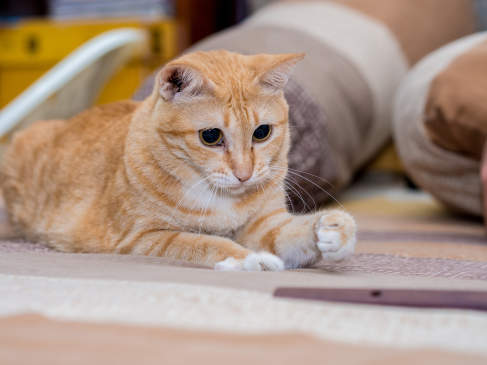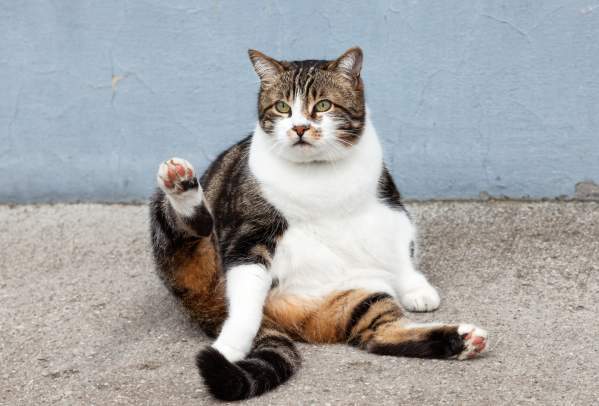There's a reason that fat cats have cemented themselves as a stereotype in pop culture. Garfield, the fat orange cat who loves lasagna, is perhaps one of the most famous cartoon cats of all time. Heathcliff is another notable pudgy orange cartoon cat. Is it just a coincidence that people think of felines as chubby, or is there any truth behind the fat cat stereotype?
As it turns out, cats are prone to becoming overweight. There are many factors that can contribute to a cat’s excess weight, including a sedentary lifestyle and, like Garfield, a love of food! Despite how cute and cuddly a fat cat can look, an overweight cat has an increased chance of developing serious health risks, so it's important to help your cat reach and maintain a healthy weight.
What is a healthy weight for my cat?
How do you know if your cat is overweight? It can be helpful to start by understanding what a healthy cat weight is.
A cat's weight will vary based on their breed and the general size of their frame. "Most adult cats, depending on gender and breed, should maintain a healthy weight of between seven and twelve pounds," says Cullen M. Dauchy, DVM, a veterinarian at and former owner of Katy Veterinary Clinic in Katy, Texas.
According to International Cat Care, if a cat weighs 10 to 19 percent above its optimal weight, it’s considered overweight; if it weighs 20 percent or more than its optimal weight, it’s considered obese.
Signs that your cat is too fat
If you're not sure how much your cat weighs, or you think your cat’s in danger of becoming overweight, it can help to learn how to spot the signs that your cat is too fat. This may include:
A large, loose, or sagging belly that hangs down
Extra padding around your cat’s ribs
Visible fat that covers your cat’s spine and shoulders
Health risks for overweight cats
It's commonly known that being overweight poses health risks for humans. The same applies to cats. "Overweight cats have an increased risk of developing diabetes, fatty liver disease, and joint stress from carrying around extra weight," says Dr. Dauchy.
Other weight-related health concerns for cats range from decreased stamina and exercise tolerance to lower urinary tract issues and non-allergic skin disease. Keeping your cat trim can help them stay healthy.
How to help your cat maintain a healthy weight
The best way to manage your cat's weight is to try to keep them from becoming overweight in the first place. Start by making sure your cat gets enough exercise and that you’re not overfeeding them. "Sometimes it can be difficult to achieve weight loss in an overweight cat,” says Dauchy. “They can drive you crazy with incessant crying or meowing for more food, so it’s really important to not allow a cat to become overweight in the first place."
However, if you've got a Garfield on your hands, fear not. These simple tips can help you and your cat tackle weight loss.
1. Feed your cat less
Experts at the Cummings School of Veterinary Medicine at Tufts University recommend decreasing the amount you feed your overweight cat by 20% to 30%. This can help decrease the number of calories they're taking in, which can help them lose weight.
2. Feed a cat weight-loss specific food
If your cat is overweight, your vet may recommend feeding them cat food specifically formulated for weight loss. These options are lower in calories and specifically created to help cats shed weight.
In fact, in a study published in August 2015 in the Journal of the American Veterinary Medical Association found that overweight cats successfully and consistently lost weight when fed weight-loss food. Another study published in February 2018 in the American Journal of Veterinary Research showed that cats successfully lost weight when fed a moderate-protein, high-fiber diet. So if your cat is overweight, try switching up their diet.
3. Help your cat exercise

Encouraging your cat to move more can help them burn calories and shed fat. If you want to get your lazy cat to exercise, consider getting them a toy that encourages movement, like a laser pointer, which you can move around so your cat can chase it.
You can also take your cat out for a walk. There are harnesses and leashes made for cats, and if you're willing to spend some time training them, you can get your cat to happily go for a walk by your side. Just make sure you have your cat vaccinated to avoid parasites they may be exposed to outdoors. And have you pet microchipped before taking them out for a walk.
Your cat's weight matters
Garfield might be cute. But if Jon Arbuckle took him to the vet, he'd probably find that his beloved orange cat was at risk for some serious health problems.
If you're having a hard time helping your cat lose weight, your vet may have helpful pointers to help lead your cat toward a successful weight-loss journey.
